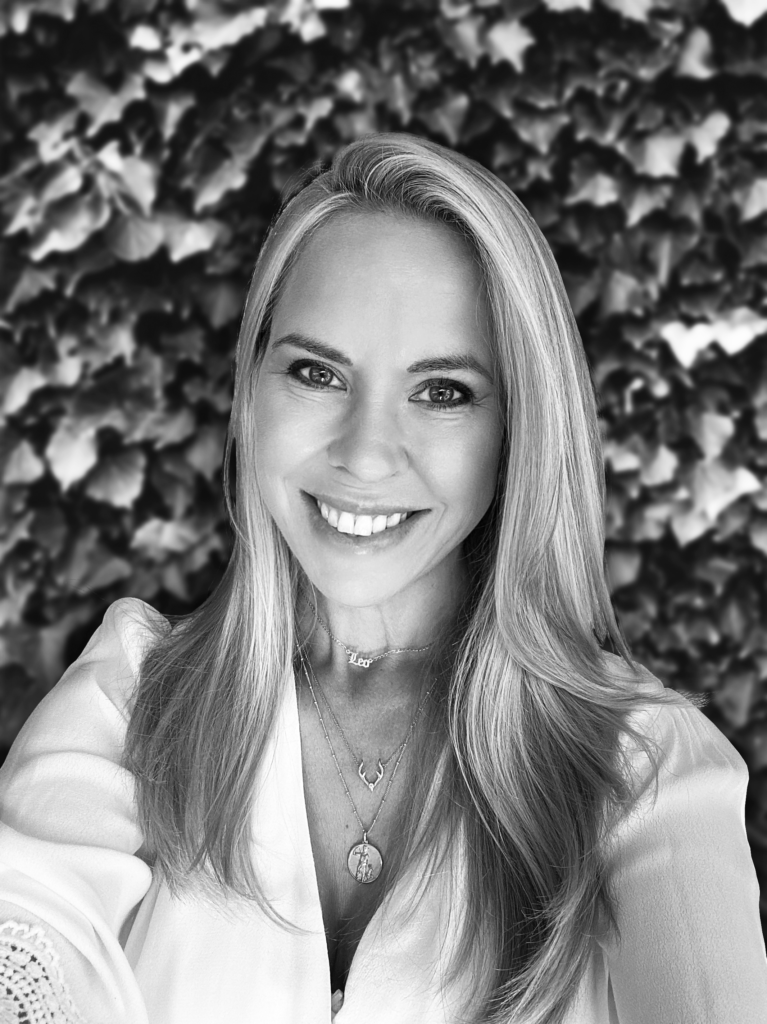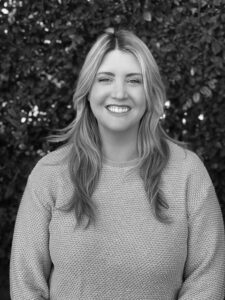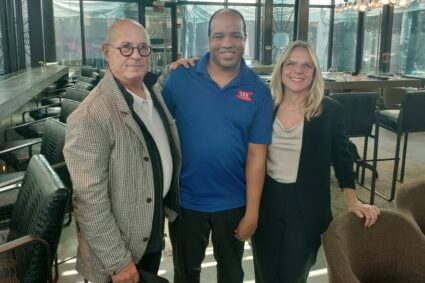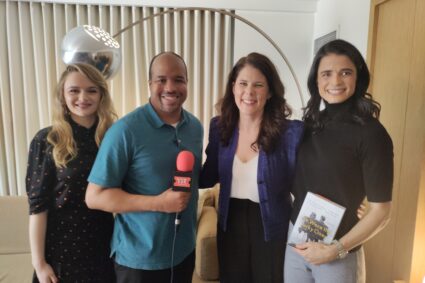
On this edition of the INTERVUE, I will be talking to two partners who are part of Fanthorology and their exclusive release of their own Building Universes Handbook. This comprehensive book of how successful entertain the universe’s function is for stakeholder stakeholders of every site. And here with me to talk about it are the Co-partners in Fanthropology! We have Kris Longfield, who is the partner Head of Research (and a Mad Scientist) which I can relate to the last one and Kristie Kershaw, who is the founder head of creative marketing, and horse and hound enthusiast.
Welcome to THE INTERVUE, I’m so glad to have you both with us today.
Kristie K. : Really happy to be here. Yeah. Thank you.
Oh, that was history. I love that. All right, so the first question I want to ask both of you, let’s talk about anthropology. How did you get started? And how did you get involved? Abby created this wonderful partnership. Now we’re going on almost nine years?

Kristie Kershaw (KK): Kristin and I met at an agency. We were all sort of under the same roof. And this agency, it had four floors and people of all stripes. It was called the Cimarron group. And we were pulled together in a sort of Think Tank, where Terry Curtin who was there at the time, and was working with Damon Wolf and Stephanie Ledbetter, they had the idea to start pulling together lots of stakeholders in the building to think more broadly about what was possible and I absolutely loved it.
I have a background that goes from my primarily entertainment, but also brand. And the time I spent in brand, I really brought back a lot of the strategy that is involved in that long term planning, which historically in movies, we don’t, hadn’t necessarily had, because you’re inventing a brand, launching a brand, selling a brand and closing out a brand, almost like in a really narrow window of time compared to what you have when you’re selling a BMW or Nikes.
When I got back in entertainment, I sort of brought all that knowledge with me. And then when I met Kristin, who at the time was really an early pioneer in social listening, that was where you were able to suddenly get so much consumer insights so quickly, that you could then craft a plan and start to put it into action, in enough time for that shorter lifespan of a brand like a film. And so, it was just sort of a match made in heaven. I thought she was an absolute genius. She was working on Twilight when I met her and I’ll let her take it from here.

(Partner, Head of Research)
Kris Longfield (KL): Oh, yeah. So I was, I’ve always been interested and passionate about studying bands and what they want and what they’re into and how they interact with each other. So Kristie met me, I was running around this four story building with sheets of printed out comments, I’m trying to persuade everyone that this is this is what we needed to be paying attention to, and that we can figure out how people are going to respond in advance. So I started working with Kristie, and she is really the person that started shaping it into something that other people understood before I was, you know, the mad scientist running around with something that nobody had really done yet even. And so it became a real strategy that people could use and implement and understand.
KK: Yeah, and so those early decks that we did really did, from what I hear, make their way around town a little bit and cause a bit of a splash and it was really the beginning of taking this very long lead. Approach to sort of understanding first what the audience wants and then putting together your early marketing materials based on an early hypothesis, right? I mean, Kristin is, you know, there’s a little bit of mad in the scientists, but plenty of scientist in there. It’s the scientific method, you know, you observe and make a hypothesis and then create and cut and test. So, it’s a little out of order from historically entertainment is and will always be a very gut led business. But the better informed your gut is, the higher that first cut is going to test.
Absolutely. And being the fan myself of different universes, and you touch on a question I never thought of, I thought of just now, how do you study fans? Do you go to conventions? Do you pay attention to the social media? How do you study depends on to determine to build this universe as far as the handbook goes?
KL: Well, as far as the handbook when, I mean, obviously, I spend a lot of time studying fans in the sense that I am almost never, not studying fans, I go to conventions, I talk to fans, I read everything that they’re posting online about different projects. You know, I’m watching their tic TOCs. I’m looking at their YouTube videos. So I am never really out of it. I’m in the discussion forums, understanding what the inside jokes are, and like, how does anybody relate to each other.
And so that is a lot of what I brought to when I started. So, as I was researching this, I knew where to go look, where people were talking about things that they felt worked or didn’t work. And I brought a lot of that also as a filter, as I was reading a lot of academic work and industry studies, you know, and so you can take that fan and audience understanding, and really look at what the industry thinks and what academics thinks and say, okay, where is that matching up? Where are people consistent? And where do things not seem to matter quite as much that that people are trying to call attention to, it’s really about sort of winnowing everything down into? How does how, what’s working for bands, what’s impacting them?
KL: Kristen, is the best at that. I mean, her ability to separate signal from noise is distinct from anybody I’ve ever met. I think that there’s just a real ability to understand that although it might not be a high volume of conversation that’s happening. She can really see how conversations are traveling, who’s influential, how it’s catching fire, how it relates to broader trends she’s seeing in the mainstream and together, we’re able to go through all the information we find and say that that right there. That’s the thing that’s going to move the needle.

And I can tell by her passion that she separates the noise from what is really needed for this handbook. So now that’s a perfectly good segue to talk about this handbook. I want to know what went to the process. How long did it take? And why do you feel is a good time to release this handbook as far as marketing and strategy goes?
KL: Well, it was an 18-month process, we got the idea, not that long into the pandemic, really, because as everything started to shift away from theatrical in that moment and towards streaming, um, suddenly, this cross between film and TV became possible in a way that it really hadn’t been done before. And so yeah, the universe is no longer, you know, it’s either in film or in TV, but it’s everywhere.
So that’s something that people really needed to know and understand about. And that’s something that I had always sort of been watching throughout the throughout the last decade. It sort of hit that it was the time to start looking into it and making it something that is understandable on a broader range for the industry because we’re very far into the research and translating that research for everyone else, is one of the most important things I think we can do making it something that the average person in the industry can just pick up and say, “Yes, that’s right” or I always had a sense that That’s sort of what it was working, but you’ve made it very clear. Or there’s an insight here that now informs how I do my work. Um, yeah.
So then the process of really getting into that it was so much reading. There was really an entire month, I did almost nothing but read paper after paper book after book, discussion forum after discussion forum even to really put it all together It was like, a very, very intense dissertation in terms of like, what I was doing.
Amazing. Did you study a number of the different franchises universe out there for this handbook?
KL: We studied? Oh, gosh, I think it was, like 30 different universes. And then another 30 or so franchises that we saw, I thought were sort of on the cusp. Like they weren’t quite a universe yet but they could be. And that’s especially something we’re paying attention to, as you know, as the industry finds that universes are more important and more valuable and more interesting to audiences who want to spend a lot of time exploring a world.
Very interesting. I may have to pick your brain to figure out what thirty universes you have studied.
KL: Oh, there, we cited a lot of them in the report. I tried to make sure we were pulling a lot of examples together so that people could really look at things and see what was happening.
KK: Well, part of the goal of the report series for people because it really is, it’s a bones of what’s possible in a universe. And so, you know, an individual title lights up like an MRI, but this is an x ray of all the possible bones. The idea is that anybody can read it and project onto those bones, their own imagination, universe that they might be familiar with, and just look at it and kind of go, Oh, I get it. That’s what’s happening there. When I see that, you know what I mean?
KL: I like to think of it also as being a little bit like Legos. And we’re just trying to it’s trying to show you all the different pieces and the ways they might fit together and then you get to build your own thing.
You right, because especially as many years I’ve been involved with fandom, it defaults with watching the show to go into conventions of being in fan films and different projects. So and now with streaming media, these franchises have really exploded, during the pandemic.
KL: Oh, yeah! And I love both of those universes. So much that it’s exciting to watch everything that they’re doing and what they’re experimenting with. And, you know, they’re out on the fringe of inventing more new things about how universes will work in another 10 years, we may come back and say, Okay, we’ve learned more.
You’re right. Now, will this handbook be available to the public for people to see or suggest for industry advisors?
KL: We made it available on our website so that anyone can download it because you know, here’s the thing, you may not be in the industry today, but that doesn’t mean you won’t be in it someday. I think, if you’re in film school right now, that is one of the people I really want to read it because they’re going to be making the future of the industry.
How did you guys help move the needle with some of the extremely popular franchising universes that we have out there right now?
KK: I will say because our client went on right occurred already and talked about it a little bit. We have helped with the John Wick universe. And that’s exciting. I can’t say what we’re doing. But I can say it’s going to be expanding. And that’s going to be incredibly exciting. It’s a really beloved franchise, and we got to work on a little bit. Look at that. Look at the fan appetites for John Wick 3. And it is such a, it’s just so cool how much people love that universe. And we’re so passionate and excited to help that kind of expand and grow.
And I think our biggest passion is really just creating that win-win for our studio and streamer partners, you know, just to really help them understand what people really want. And not just in a current moment, but in a future looking way, and helping to make sure that that’s what they deliver. Because it’s just the greatest thing. You know, I think we all remember having been sort of duped at some point in our lives by a movie trailer, right and coming out as a career creative. Listen, I was a copywriter, I wrote some of those trailers, I was directed to write a trailer, that might have misrepresented the film, because the film itself maybe wasn’t exactly what people wanted.
And, the marketers must do their jobs, and they must make it look as good as they can. And that always broke my heart a little bit. Um, and so what I love so deeply about what we’re doing now is the altruism of it. Honestly, at the risk of sounding too earnest. I just think it is so thrilling and exciting to get the insights into the crater’s hand so that they can make the thing that people want most.
KL: I’m going to add in, I think my favorite thing is, you know, we’ve all heard stories where like, the better version of a film or show, they had it at one point, and then they lost it. And so my favorite thing is jump in and be like, “You’ve got it! We’ve got the research, you’re on it!” you, you know, your perfect stuff, don’t, you know, to my absolute favorite thing is to be able to say, you know, you’re nailing it, just, you know, you’re on the right track. Don’t let you know, something new come in and throw you off.
I mean, we have other scenarios, too. But my absolute favorite is when we can come in, and really provide the support that people need, because there’s always someone who’s like, this is it, we’ve got it. And we can come in and be like, “And here’s all the proof.”
When it comes to know your audience to create that connection, especially when it comes to the franchises have been around for decades. How do you create that connection, to make sure you capture both audience and not only and not alienate either one?
KL: Well, this is something that both franchises and universes need to be thinking about constantly, you know, as they evolve, there always must be a gateway in for new audiences. And sometimes that means it’s a character who is an audience surrogate. Sometimes that means that it is a new story that isn’t connected yet to some of the older stories. Sometimes that means that you’ve got to do a lot of setup and explanation and orienting those new audiences, you know, bringing in a high concept hook that can speak to audiences that aren’t familiar with the history.
I have found that when you do something fresh and exciting for an audience, for a pre-existing audience, it can sometimes be a little bit scary. So, you also need to do that work to make sure that they’re ready and they’re on board and they understand what you’re doing and that they know that you’re not intentionally disappointing them, but that you are creating exciting new pathways that kind of can connect to what they know and love but aren’t holding to it.
Honesty and trust between people who are creating movies and shows, and the people who are watching them is incredibly important. And I think that’s something that a lot of people learned from that incident, that there is an element of you can’t quite You can’t be so distrustful, you know, or doing things but not allowing the fans to enjoy their theories and their ideas of what might be about to happen.
If you don’t, if you tried to downplay so they can’t have that anticipation, you’re hurting something that ultimately benefits the story, you know, that people think this might happen, or something else might happen. Just makes them more excited. You know it, you don’t want to spoil it, you don’t want to confirm, but you do want to let them have their theories.
KK: I think the dance between creators and fans it’s such an interesting one because you know, on one hand, you don’t want the tail to wag the dog craters need to create and they need to have room to innovate well beyond what an audience may say they want or think they want. And that’s where the importance of translation comes in. Because you can see or hear that people had some I didn’t I wasn’t working on this. So, I’m speaking more theoretically. But say the Star Trek reference you made people rolled their eyes and oh, God and no, and why are they going to do this. That’s just a lack of faith on the part of the fans, it doesn’t mean there’s not appetite, right? It’s just fear and protectiveness over something that they love. That’s a very simple example. But that’s the kind of translation we try to provide is to not just pick up what people are talking about or what they’re feeling, but why they’re feeling it contextualizing that and digging into understand what would make possibly them happier, where there is room to innovate?
KL: And what do you do to make them feel safe and ready to enjoy a new story or a new iteration of a story? You know, sometimes and it’s different for every audience in every fandom. But you must really understand them, you know, what? Not just what are they looking for? But how are you emotionally connecting to them?
True to that point, last question, but make this quick. We’re coming up on 10 years of Fanthropology next year in 2023. Any big plans?
KL: Ah, so many, you couldn’t stop me from having big plans. I don’t like to tip my hand because you know, you got to see what works and where the research points that something is super viable. I spent some time this year studying futures thinking. And so, we are thinking about the future an awful lot. Both in terms of the industry and how society at large could change and impact the industry. So wherever new things happen, that’s where I plan on being.
KK: That’s always our Kristine. Yeah, it just gosh, I know, it is so exciting. Thanks for pointing that out. Our 10-year anniversary is a big deal. I think, you know, this was our first free report that was non-commissioned. We’ve never done that before. Our work is always you know, proprietary, confidential and by request from our clients. I think this was a really fun act of service to do for the industry and for creators, and particularly, as Kristine mentioned, that the junior future creators out there, as well as just helping everybody in our age in our industry get on the same page, you know, you have Junior marketers that are still wrapping their heads around things and have big ideas and want to participate and the faster you really understand this as a business that you really do have to live in a bit, too, you know, particularly The marketer to really get what you’re trying to sell. We’re just loving being of service. And I think that we’ll come up with something fun to release next year for our 10th anniversary that can be, you know, public facing and get people inspired. I would love to do something else like that.
You can check out this amazing handbook at Fanthropologyco.com


